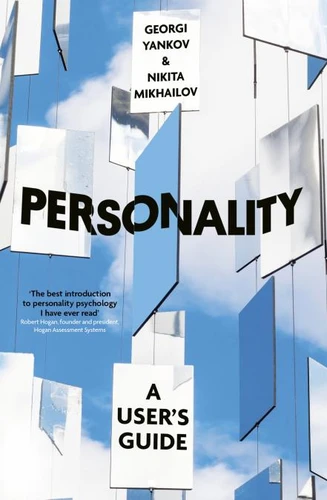Personality. A User's Guide
Par : ,Formats :
Disponible dans votre compte client Decitre ou Furet du Nord dès validation de votre commande. Le format ePub protégé est :
- Compatible avec une lecture sur My Vivlio (smartphone, tablette, ordinateur)
- Compatible avec une lecture sur liseuses Vivlio
- Pour les liseuses autres que Vivlio, vous devez utiliser le logiciel Adobe Digital Edition. Non compatible avec la lecture sur les liseuses Kindle, Remarkable et Sony
- Non compatible avec un achat hors France métropolitaine
 , qui est-ce ?
, qui est-ce ?Notre partenaire de plateforme de lecture numérique où vous retrouverez l'ensemble de vos ebooks gratuitement
Pour en savoir plus sur nos ebooks, consultez notre aide en ligne ici
- Nombre de pages384
- FormatePub
- ISBN978-1-4721-4792-9
- EAN9781472147929
- Date de parution31/01/2024
- Protection num.Adobe DRM
- Infos supplémentairesepub
- ÉditeurRobinson
Résumé
'The best introduction to personality psychology I have ever read' Robert Hogan, founder and president, Hogan Assessment SystemsWe are each born with a particular genetic makeup and traits that are further shaped by our individual environments and life experiences, creating a personality unique to us. But at no point are we given a manual for how to use that personality in our relationships or at work, for how to make sense of the facets that create our sense of self, or for how to troubleshoot our personality if there are things we are unhappy with.
Personality: A User's Guide is that missing manual. An authoritative and comprehensive guide to personality psychology, this book outlines the different building blocks of our personality, presents the many theories and models that have been argued over the years, and helps you identify where you stand on the spectrum of key traits that define us. Using this knowledge about yourself, the book also suggests ways you can better empathise with those around you who may have very different approaches to the world, and how we can all leverage our different strengths.
The authors also consider the constantly developing nature of the self, and ways we can turn that to our advantage and make changes for greater success and wellbeing. Finally, the book looks at some specific questions: Can our pets be said to have their own personalities? What happens when the 'dark triad' of negative traits are dominant? And is there a future in store where we can say that an AI has a genuine personality?
Personality: A User's Guide is that missing manual. An authoritative and comprehensive guide to personality psychology, this book outlines the different building blocks of our personality, presents the many theories and models that have been argued over the years, and helps you identify where you stand on the spectrum of key traits that define us. Using this knowledge about yourself, the book also suggests ways you can better empathise with those around you who may have very different approaches to the world, and how we can all leverage our different strengths.
The authors also consider the constantly developing nature of the self, and ways we can turn that to our advantage and make changes for greater success and wellbeing. Finally, the book looks at some specific questions: Can our pets be said to have their own personalities? What happens when the 'dark triad' of negative traits are dominant? And is there a future in store where we can say that an AI has a genuine personality?
'The best introduction to personality psychology I have ever read' Robert Hogan, founder and president, Hogan Assessment SystemsWe are each born with a particular genetic makeup and traits that are further shaped by our individual environments and life experiences, creating a personality unique to us. But at no point are we given a manual for how to use that personality in our relationships or at work, for how to make sense of the facets that create our sense of self, or for how to troubleshoot our personality if there are things we are unhappy with.
Personality: A User's Guide is that missing manual. An authoritative and comprehensive guide to personality psychology, this book outlines the different building blocks of our personality, presents the many theories and models that have been argued over the years, and helps you identify where you stand on the spectrum of key traits that define us. Using this knowledge about yourself, the book also suggests ways you can better empathise with those around you who may have very different approaches to the world, and how we can all leverage our different strengths.
The authors also consider the constantly developing nature of the self, and ways we can turn that to our advantage and make changes for greater success and wellbeing. Finally, the book looks at some specific questions: Can our pets be said to have their own personalities? What happens when the 'dark triad' of negative traits are dominant? And is there a future in store where we can say that an AI has a genuine personality?
Personality: A User's Guide is that missing manual. An authoritative and comprehensive guide to personality psychology, this book outlines the different building blocks of our personality, presents the many theories and models that have been argued over the years, and helps you identify where you stand on the spectrum of key traits that define us. Using this knowledge about yourself, the book also suggests ways you can better empathise with those around you who may have very different approaches to the world, and how we can all leverage our different strengths.
The authors also consider the constantly developing nature of the self, and ways we can turn that to our advantage and make changes for greater success and wellbeing. Finally, the book looks at some specific questions: Can our pets be said to have their own personalities? What happens when the 'dark triad' of negative traits are dominant? And is there a future in store where we can say that an AI has a genuine personality?



